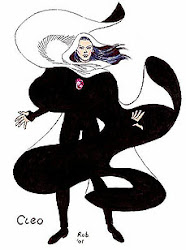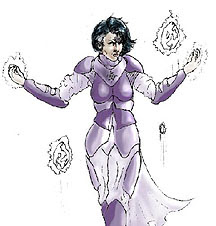Occasionally, I come across a poem in SONS OF MEN, the title I gave to the overall collection of 100 poems as well as to the first volume in the trilogy, and I simply do not recall what motivated the writing of that poem.
The following is another poem that I also do not recall specifically when I wrote it, except that it was while I still taught at the Academy, and was likely written before I was being investigated and finally forced to resign.
I arrived at the Academy in late June or early July of 1978. By June of 1979, I had just finished teaching a summer makeup English class. During the next academic year, I was to attend an advanced Air Force officer's career development school, I believe in Alabama, for one semester. But the day after I had finished teaching that course and while I was debriefing with a few fellow officers in one of their cubicles, the Chairman of the English Department poked his head in and asked to see me. As I accompanied him, I could immediately sense that something was very wrong; but I had no idea what it could be. He finally mentioned that we were going to see two men in the department conference room who had business with me.
As we entered the room, Colonel Shuttleworth introduced me to the two OSI agents and uncomfortably departed. They invited me to sit down. One of them opened a brief case on the conference table and frankly revealed to me, "We have the letters."
I suspect that they hoped I would be sufficiently stunned by the news that I would tell them anything. I said nothing. I was too shocked to speak even if I were the type to rat on my fellows which, obviously, I am not. When they asked if I would reveal the names of any other gay or lesbian officers at the Academy, or any others whom I had known before, because we were all security risks, I defintely said nothing. They then--finally--advised me: "Well, you know you are allowed to have an attorney." Their report of our meeting, of course, did not bother to mention that they had tried to pressure information out of me before I was told of my right to have an attorney. If you didn't suspect this already, the OSI, too, can be liars if the pose suits their needs.
You see, the cadet with whom I had become personally involved, though not sexually, had pleaded with me that he needed to go on leave to visit his parents in Maryland rather than attend a makeup class that summer at the Academy. Since I was his humanities adviser, I visited the officer who had taught the class that Cadet Bostic had failed and needed to make up, explaining his personal predicament. The other instructor granted my request and off Bostic went on leave. But before he left, what I did not know was that he had been seeing the OSI for a number of weeks before that. Every time we met or he had visited my house or come to my cubicle to speak to me, he reported to them what had happened and whatever we had spoken of during our personal encounters.
Of course, when I later read the report of these surreptitious OSI meetings, what he had told them was not always the total truth. About one third of his statements were the truth. One third of what he said to them was a subtle or obvious twisting of the truth. And one third of his statements to them were total lies.
A few months earlier, after I had become his advisor, he would come to see me whenever I was showing a film as Officer-In-Charge (OIC) of the Cadet Film Club. He'd also stop by my cubicle in the English Department to chat. But not long after that, he became quite overtly friendly toward me. Sometimes he'd become physically close, almost intimate. One time in the projection booth, when I placed my hand on his shoulder to explain about some Academy group and program that he might consider joining, he immediately wrapped his arm around my waist as if to hug me. Cadets were coming and going from the booth before the film started, and I was surprised at his rather overt form of contact.
After this and other sorts of physical, and soon verbal, forms of flirting--there was no question that he was attracted to me as I became attracted to him--he was the first person to act romantically interested in me, ever--I realized that what was happening could be dangerous for both of our careers. I called him one Saturday morning, drove up to the Academy to meet with him, and we headed over to the Overlooks to privately discuss what was occurring between us. (I didn't trust the phones, and I certainly did not want to speak to him in any of the Academy facilities where our conversation might be overheard.)
It was one of those bright, blue, beautiful, almost-cloudless afternoons in Colorado that might as well be framed as a post card. The Academy itself was arrayed before us as we spoke on the cement path to the fence where tourists can see the entire academic and athletic complex at a glance. I soon explained that we must be extremely careful. That any physical forms of intimacy such as he had displayed in the film booth were dangerous should someone put the pieces together. He agreed with me that we needed to be careful.
Our discussion essentially over, I asked him where he wanted me to drive him next: back to his cadet dorm or elsewhere? He smiled and told me that he'd like to go to my house.
In those days, I was extremely naive. I never saw that his request was anything more than curiosity to see where I lived. I did not expect that he was asking to go there and for the two of us to become intimate, and perhaps he wasn't making that kind of request. Or perhaps he was.
I was, on my part, still working through me feelings toward him and what they meant. There was, obviously, a double standard at work here in the service. While Cadet Bostic told me at some point that he considered himself bisexual, it was clear to me that he was, like me, gay. But in those days, many celebrities such as Elton John or David Bowie claimed to be bisexual when they might have actually been gay or had only experimented with same-sex intimacies but were probably, or primarily, straight. But in the military, and he being my subordinate, relations between us would still have been inappropriate were we of the opposite sex. But we were gay, and any revelation of that fact to the authorities would have meant our unqualified expulsion from the service. If we were of the opposite sex--he was a female cadet instead of a male cadet and we were discovered to be in a relationship--I might have been reprimanded, forced to resign from the Academy as an instructor certainly, been given a bad performance evaluation that could have irreparably damaged my chances of a military career, but I would not have been forced to resign from the service.
Three years earlier, a famous female Olympic diver, who was also an Academy diving instructor and an Air Force officer, married the captain of the swim team almost immediately after he graduated in the summer of 1976. She was a captain at the time and he was a second lieutenant upon graduation. Clearly, it was highly unlikely that their passion for one another suddenly exploded the moment he graduated and that they had kept their feelings for one another entirely platonic and above reproach the entire time that he was a cadet and she was a diving instructor. However, what could the Academy prove? Common sense dictated that something had to have been going on well before they walked down the aisle together, but what proof was there? Eventually, she might have been reprimanded by the Air Force; but she was also a famous gold-medal-winning diver. Unlike me, she was not forced to resign from the service and retired a decade and a half later as a colonel.
When Cadet Bostic and I got to my house, I showed him around. We watched a little TV in the family room. We might also have had some lunch, and then it was time to take him back to the Academy. We did not touch. We did not kiss. We certainly did not have sex. I was still conflicted about our relationship and the appropriateness of that relationship. But I liked him and he certainly seemed to like me. On the drive back to the Academy, he told me personal details of his life that, were they widely known and been proven, he would have been expelled from the Academy.
Not more than a week later, though, he started to see the OSI and make his periodic reports to them about me. Before seeing the OSI, however, he had first gone to speak to one of the Air Force chaplains who performed services at the Cadet Chapel, I later learned. That officer had told him to forget the whole thing and not to ruin someone else's career. Bostic chose to ignore that advice and turn me in instead. In his periodic reports, he painted a very different picture from what the situation was actually like between us. Perhaps the OSI suspected more than what they were being told by him, but they simply wrote down that he was an entirely straight cadet whom this predatory gay officer had sought out and was making unwelcome advances toward.
However, they, too, needed proof of my guilt, and he appeared to be the only one who was capable of obtaining that proof. So, even though he said that my unwelcome advances disgusted and repelled him, he would continue to see me on a regular basis, in hopes of providing the OSI with the necessary proof.
But in the two months since we had met and spoken on the overlooks and he had asked to see my home, he had not been able to provide them with any actual proof. He was about to go on leave, so a more direct approach was now necessary. They had him write me a note, inviting me to write to him while he was on leave, in hopes that I would communicate something in writing that would prove I was gay. They put the note into an envelop and, while I was at the gym during lunch one day, slipped into my cubicle and placed the note on my desk. The trap was now baited.
RetirementWith youth go the warriorsand their campaigns.Coaches now and generals.No longer organized into battalionsinto teams--not even out as friendsgathered wildly in the night--we volley at individual sports.Singly served and surrenderedas surviving creatures,as crowds,who know that the time remainingis for entertaining alone.
























